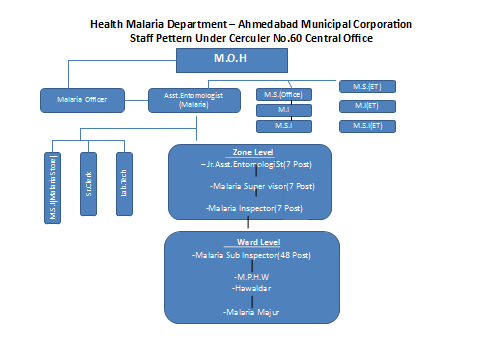Corporation | Departments | Malaria Cell
Malaria Cell
Statistics of Ahmedabad city for distribution of households by the type of source of drinking water supply records is as follows:
68.9 % households have tap water supply within their premises
19.4 % households have tap water supply outside their premises
3.6 % receive water supply from bore pumps & tube wells
Limited water supply for only 2 hrs a day is a forcing factor for container storage practices, which are preferable breeding sites for both malaria and dengue vector species.
The city is also traversed (by 9 km.)by river Sabarmati, which with increasing urbanization, and coming up of barrages, check dams, industrialization and intensive agricultural usages, along with low rainfall in catchments area etc, has become narrowand more polluted, and has thus become a breeding ground for mosquitos. However, since August 2002 Narmada river water has been fed into the river Sabarmati and also lakes and ponds of the city and surrounding areasthrough Sardar Sarovar Dam Project's Main Canal. Downstream flow river water is regulated at Vasna barrage dam for irrigation purposes. With Narmada water reaching Ahmedabad, the environmental conditions have become more mosquitogenic with rise of water table, recharging of dry French wells and bore wells, canal and feeder canals seepages and / or pools etc.
Water scarcity and indiscriminate water storage practices have established An. stephensi and Aedesaegypti (Map - 1) as throughout year prevalent malaria and dengue proven vectors. Other vector borne diseases Japanese Encephalitis, Filariasis, Plague though not prevalent but have a great threat of outbreak particularly of late.
Malaria Research Centre (Indian Council of Medical Research, New Delhi) has observed that nearly 10% of all malaria cases reported in India in recent years have occurred in the urban areas. Many cities and towns are endemic for malaria. During last two decades, malaria, dengue and dengue haemorrhagic fever have emerged as major health problems throughout India. Due to rapid urbanization and development, within and around Ahmedabad, malaria and other mosquito borne diseases have become a serious problem in Ahmedabad city
Storage of water is a common practice in almost every household. Main reason being inadequate supply of water almost throughout the year. Water is stored in a variety of containers, ground level tanks and underground tanks being the most common. In addition, all sorts of available pots, pitchers and containers are used to store water.
The major issues and challanges in containing the vector borne diseases morbidity and mortality are as under:

Fifty seven UHCs: Managed by Medical Officer, Medical Specialist (Paedtrician, Gynecologist), Laboratory Technician, Pharmacist, and for dominiciliary services Supervisors, Field Workers (Multi Purpose Health Workers), Link workers etc.
These are established under Central Government financed scheme-Reproductive Child Health (RCH) Programme, and has given an impounding thrust to the existing medical domiciliary services.
These centres are managed by the local leading NGO bodies, which motivate the communityto participate in health programs (NGOs listed in the table under Health status of the city). The proposed action plan activities under the Urban Vector Borne Disease Control Programme will be synergistically intricated with the existing RCH programme to utilize the trained manpower cost effectively.
To know the true prevalence of the disease passive agencies i.e hospitals cases are retrieved and preventive actions are therein to contain the disease transmission.
Since retrieving of vector borne private agencies are reporting to Local Health Authority about water and vector borne disease case reported to them, upon which the ring operations are undertaken to contain further transmission of these diseases.
At each Urban Health Centre and inCorporation run general hospitals facilities are provided for sampling and diagnosis of these two diseases. Samples collected from the city are sent for diagnosis to either NHL Medical College or BJ Medical College, which both are designated as sentinel surveillance centers by the central government.
The measures adopted are either
(a) Biological - using biolarvicides & larvivorous fishes ,
(b) Chemical - by using NVBDCP recommended insecticides
for both larval or adult control measures